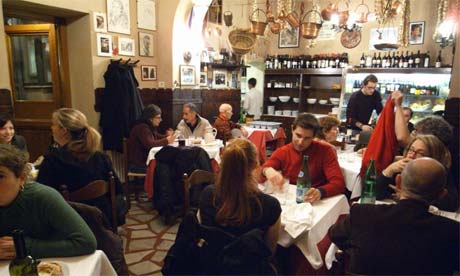
Was ever a city so dedicated to the pleasures of the table? The fifth century Apicius cookbook was full of complicated honey-braised sparrows and roasted sow's uterus dishes; today the citizens still comport themselves like emperors, but they avoid flash restaurants in favour of family run bars, side-street hosterias, simple tavernas and traditional trattorias serving the rude, rustic, offal-based dishes that comprise la cucina povera, or poor food.
Half-drunk and three quarters-stupefied by overindulging - all in the name of research - I wandered Rome's great mesh of twisty cobbly alleys and vast processional boulevards.
First, a real hosteria. No menu board, tiny chequery tables, non-ironic strings of garlic hung from the ceiling, bonhomie and conviviality - and cheap, too. Dino, in his red jumper and Thunderbirds are go eyebrows, runs his Express (Dino's Express, via Tacito 80, +39 6 361 03 05) with mum and sister in the kitchen. The menu changes daily - a couple of starters, four or so mains, all old family recipes - and hand-written on squared scrap pads. Dino sings a little, flatters a lot, and dances over with plates of perfectly light polpette (meatballs). Wine, from his uncle's farm in Frascati, comes in washed-out water bottles: you pay only for what you take. In my case, €15 for more than a man ought politely to eat or drink.
Next, an enoteca. These are wine shops for the most part, often with a bit of a deli attached, and perhaps a few tables where you eat dishes that encourage you to drink more. There's a posh one up the road from Dino's called Del Frate (via Degli Scipione 122, +6 321 1612) with 300 wines by the bottle, from €25 to €2,500 and favoured by off-duty cardinals. Another, Al Parlamento (via dei Prefetti 15, +6 687 3446), has a stunning selection of estate wines. My favourite is Capranica (Piazza Capranica 99/100, +6 6994 0992). There's a tavola caldo (hot table) featuring fresh pastas, stews and vegetables for around €10, plus a full menu of starters, rich risotti, sauteed sausages, crunchy salads, juicy pizzas and big fat grills. The walls are lined with bottles from every Italian region, and the heavenly list features at least 350 labels, from €18 to the sky's the limit. A fine place to while away many hours, with proper music, too: a bearded curate on the next table was grooving to Thelonious Monk.
Piazza Navona is famous for places to eat and drink. I really like Piccola Cuccagna (via Cuccagna 14, +6 686 1920), famous since 1950 for its stagey waiters and dodgy lighting. Surrounded by pictures of the owner meeting luminaries like Fidel Castro, Bill Clinton, and a bloke I think was in Z Cars, you eat the unapologetically impolite foods favoured by Romans - pasta with small intestine, tripes alla Romana, and puntarelle (vinegared chicory shoots with anchovy sauce) - all to be glugged thankfully down with carafes of good rough red. About €25.
Trastevere, on the Tiber's left bank, has a slightly younger vibe. There are Irish bars to avoid, coffee bars to adore, and charming atmospheric back streets to get lost in. Along one of these is Da Lucia (Vicolo del Mattonato 2, +6 580 3601), behind whose frosted glass door lies the warmest welcome and the most delicious undressed grub. This sort of simplicity takes years to perfect and is as plain as old Uncle Ennio's bald pate, and as stylish as his slacks and loafers. No garnish or food frippery serves to distract you from the business of losing yourself in family cooking at its finest. Your herring comes soused in orange juice and your bucatini comes with a tremendously gutsy tomato, pecorino and bacon amatriciana sauce. Bargain wines, rabbit stews, bowls of oranges and there you are, warm and happy in the womb of real Roman hospitality, a martyr to pleasure.
· Until March 28, Kirker Holidays (+44 (0)20-7593 2288, kirkerholidays.com) is offering three nights for the price of two at the Capo d'Africa: £455pp (saving £83) including flights from Heathrow, Bristol, Gatwick or Manchester and transfers.

